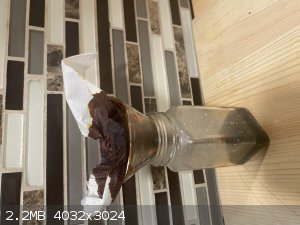
CwisGons - 13-8-2021 at 19:28
Hello everyone. I tried to follow this procedure in order to make dinitrophenol:
https://sci-hub.st/10.1055/s-2003-42063
Once I mixed everything, there was some red gas (probably nitrogen dioxide) and I had to go outside. Also, I added the TCCA, then the Sodium nitrite
together, next the wet silicon dioxide, and then the phenol. Once the reaction completed, I washed it with DCM and filtered it. It created a very red
filtrate which doesn't look anything like the yellow dinitrophenol. Does anyone know what I'm doing wrong?

Triflic Acid - 14-8-2021 at 06:57
That looks like tar, did you keep the temperature under control? Generally phenol nitration is pretty messy
CwisGons - 14-8-2021 at 14:23
How do I keep the temperature down? It heated up really fast when I mixed the TCCA and sodium nitrite, and released nitrogen dioxide. I have two
ideas:
Could I freeze the wetted silica?
Or should I keep the reacting mixture in salted ice water?
Do you have any other ideas?
Boffis - 17-8-2021 at 03:51
Have you tried steam distillation for the optimistic  ? Mix the reaction mixture
with water instead of DCM and boil it off into a condenser.
? Mix the reaction mixture
with water instead of DCM and boil it off into a condenser.
I must admit that the reaction sounds too good to be true. The way I see it, you mix a fuel with a highly reactive oxidizing agent then add another
equally reactive oxidizing agent and finally a catalyst for good measure. With no solvent there is no means of thermal homogenization so you are going
to get localised overheating and with such a mixture this is surely going to lead to a hellish heterogeneous reaction mixture and therefore charring
and tar formation. Nitrating phenol with ice-cold dilute nitric acid is problematic enough but this procedure is much less controllable.
To be honest I think you are lucky to still have your eyebrows (I presume you still do!). I have seen this paper before but never tried it because it
didn't sound like the sort of reaction that I could safely scale up. So I have to congratulate you for your attempt and don't be too disheartened.
One point though is that in the paper they give the example of 4-chlorophenol. This phenol is considerably less susceptible to oxidation and so maybe
the reaction works better on such a substrate.

 ? Mix the reaction mixture
with water instead of DCM and boil it off into a condenser.
? Mix the reaction mixture
with water instead of DCM and boil it off into a condenser.